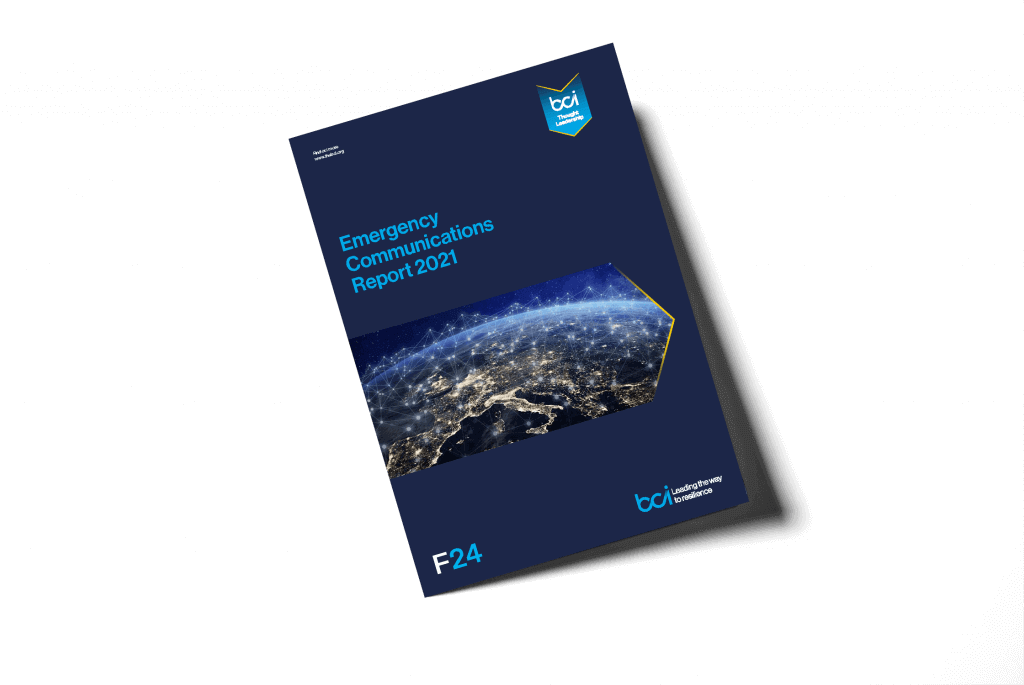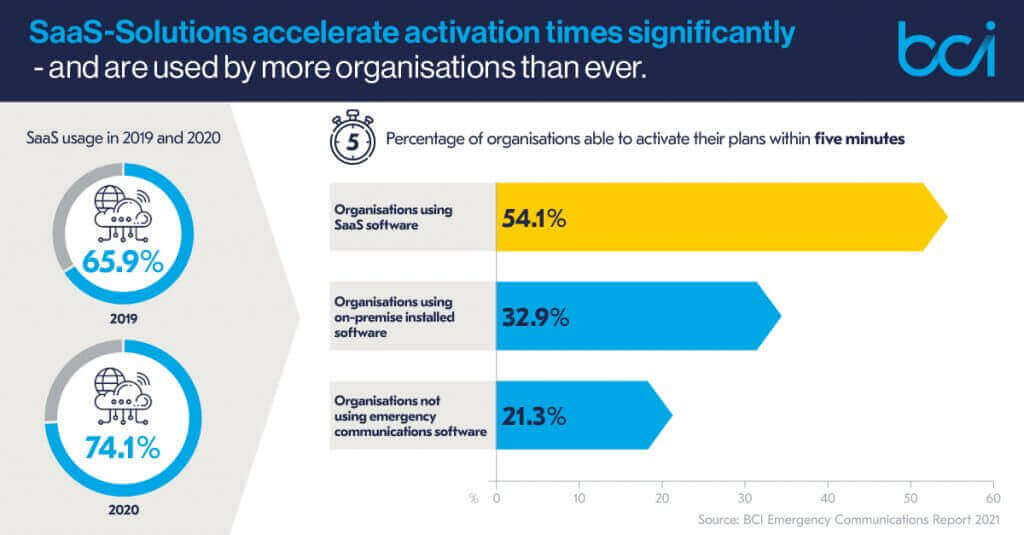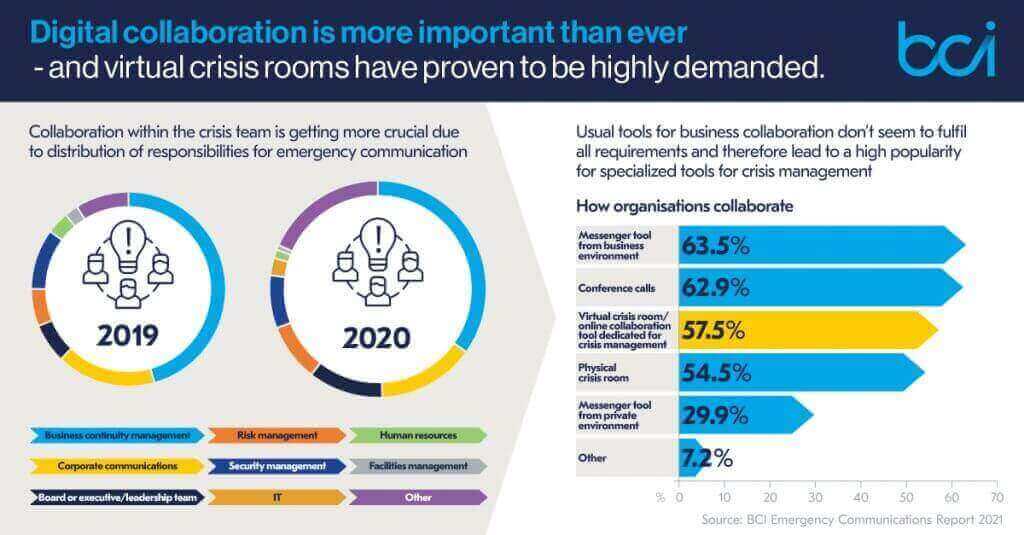Press Release
BCI Emergency Communications Report 2021

BCI Emergency Communications Report 2021: The pandemic has driven organizations to adopt collaboration software in 2020 – and this trend is expected to continue for 2021.
Caversham, UK – 8th February 2021
The BCI, in partnership with F24, has released the 6th edition of the BCI Emergency Communications Report. This annual publication provides insight into how organizations communicate in an emergency, the key communication challenges organizations face, and how technology is helping to assist in communications processes.
Organizations are moving away from tools from such as WhatsApp and using more collaborative tools such as Microsoft Teams, which is also being used in incident situations. Many organizations, who have been using collaborative tools/software for the first time in 2020, are now seeking to extend investment into specialist emergency communications technology solutions.
With the rise in remote working, the use of software-as-a-service (SaaS) has continued to rise in 2020 with three-quarters of organizations now using it – compared to 16% who use on-premises installed software. SaaS technologies have the advantage of being able to be deployed quickly across multiple devices and for plans to be activated faster.
Cost remains the primary barrier – especially for smaller organizations – to investing in emergency communications solutions. 30% of organizations who have no dedicated tools or software admit cost is the major barrier. However, the interviews in the report showed that, because of COVID-19, senior management are interested in investing in emergency communications solutions tools – showcasing the need for such a tool to be employed.
Activation times are getting quicker: 41% of organizations can now activate their plans within the ‘golden five minutes’ – compared to 32% in 2019. Although some of this improvement can be attributed to the rise in the use of SaaS technologies, some of it is down to increased training and exercising of plans. Many organizations reported that COVID-19 has resulted in multiple activations this year which have helped to highlight issues causing delays in activation.


In 2020, 57.5% of organizations reported using virtual crisis rooms – compared to 54.5% who reported using a physical crisis room – but with most organizations having less staff on site, the move to virtual environments is expected to rise.
Previous reports have highlighted an overreliance on tools from the private environment for communication during emergency situations (e.g. WhatsApp). Whilst these are tools that most people are familiar with, they do not have the functionality required for a safe and secure solution for communication. This year, just 19% of organizations admitted using a tool such as WhatsApp for communication during an emergency.
The level of training and exercising carried out in organizations has remained unchanged in 2020. Three-quarters of organizations have still been able to train their emergency communications plans this year and 82% have been able to exercise plans. Real-life activations due to COVID-19 have also acted as a training tool and they are likely to be a factor in faster response times and meeting response time targets.
Other report findings include:
- Communicating with staff was the primary concern for organizations in 2020: just over half (52.2%) admitted communicating with staff was their primary challenge during an incident, but only two-thirds (68.2%) kept employee contact details up to date.
- The number of organizations able to achieve their expected response times has risen for the fourth year in a row to 78.5%.
- Senior Management are frequently the failure point in many organizations: many have been involved so heavily in the COVID-19 response, they have not attended training sessions.
- Nearly three quarters of organizations have still been able to carry out training for emergency communication plans at least every twelve months.
- Business Continuity and Crisis Management are frequently taking joint responsibility for managing the emergency communications process.
- Disease outbreak accounted for over half (51.7%) of emergency communication plan activations in 2020 compared to just 2.7% in 2019. Increased phishing attacks this year have resulted in an increase in alerting for cyber security incidents or data breaches from 19,7% in 2019 to just under a quarter (24,7%) now.
- An increase in fake news this year has been a challenge to organizations: unofficial news sources are more frequently being used for information than official ones.
- Organizations are increasingly looking to automate the updating of data on emergency communication systems by syncing with HR records. 49.0% of organizations report this is now standard practice compared to 43.0% in 2019.
- Adoption of Internet-of-Things (IoT) devices as part of an emergency communications plan has not seen any increase in 2020: many are still wary of the effectiveness when all data needs to be fully checked by a human before it is escalated.
Rachael Elliott, Head of Thought Leadership at the BCI, on this year’s report:
“2020 was a testing year for all organizations, but one which has transformed the way businesses communicate. This year’s report shows how organizations have been switching physical meetings to virtual settings, with most exploiting collaborative technology such as Microsoft Teams or Zoom more than ever before. The success in using such collaboration tools has driven many organizations to consider investing in more specialist tools for emergency communications for the first time: 49% of respondents who do not currently have tools are already actively trialling new tools or are considering it. With response times once again getting faster this year and a notable decrease in the use of less reliable messaging apps, the report is testament to the unrelenting work of business continuity and resilience professionals who have continued to innovate emergency communications programmes and processes throughout the year, despite the testing conditions brought by the pandemic.”
Christian Götz, co-founder and Executive Board member at F24, responsible for Sales, Marketing & PR, HR and Customer Service, on this years report:
“The preparedness of organizations has been put to test very intense during the last year. As the experiences showed everyone clearly, there are significantly different communication requirements to cope with crisis situations compared to day to day business. Thus, it is not an option to handle those situations with the tools we all value in daily business. This year’s report shows more than ever before that using the right solution can make the difference between success and failure in managing critical situations – and therefore pays off as an investment for the future of a business.”
Press contact:
F24
Dr. Stefanie Hauer
Vice President Marketing & Communication
presse@f24.com
Questions?
Do you have any questions? We are happy to help you.
About F24
F24 is Europe’s leading Software-as-a-Service (SaaS) provider for resilience. More than 5,500 customers worldwide rely on F24’s digital solutions, which support companies and organisations through all areas of resilience. Solutions cover business messaging and service notification, emergency and mass notification, incident and crisis management, as well as governance, risk and compliance.
F24 supports customers in virtually every sector ranging from energy, healthcare, industry, finance, IT, tourism and aviation to a wide variety of public organisations. Many years of international experience have made F24 experts in improving resilience with digital solutions.
The company was founded in 2000 in Munich, where F24 AG’s head office is still located. Today, F24 supports companies and organisations in more than one hundred countries, via more than 20 locations in Europe and beyond. The F24 AG Board of Directors consists of F24 co-founder Christian Götz and the spokesperson Dr. Jörg Rahmer.
In July 2020, Europe’s leading software investor Hg became the majority shareholder in F24 AG. Since then, F24 continues to grow within the second phase of its buy-and-build strategy to further accelerate growth and expand the position as market leader in Europe.
In 2018 F24 was the first company based in Europe to be listed in the Gartner report for Emergency and Mass Notifications Systems (EMNS) and meet the stringent requirements of this prestigious institute. In addition, F24 is included in the Forrester Wave™: Critical Event Management Platforms Q4 2023, which looks at “The 10 Providers That Matter Most And How They Stack Up”. This makes F24 one of the most relevant resilience providers worldwide.
Security is a top priority for F24, which is why the highest and most up-to-date safety standards are in place. In 2010, F24 became the first company worldwide to have their Integrated Management System for Information Security (ISMS) and Business Continuity (BCMS) certified by “The British Standards Institution” (BSI). Since then, F24 AG and most of its subsidiaries have been certified up to ISO/IEC 27001 and ISO 22301 standards. In addition to annual audits by an independent accredited institution, successful re-certifications according to the international standards ISO/IEC 27001:2013 and ISO 22301:2019 took place in 2013, 2016, 2019 and 2022.
About the Business Continuity Institute
Founded in 1994 with the aim of promoting a more resilient world, the Business Continuity Institute (BCI) has established itself as the world’s leading Institute for business continuity and resilience. The BCI has become the membership and certifying organization of choice for business continuity and resilience professionals globally with over 8,000 members in more than 100 countries, working in an estimated 3,000 organizations in the private, public and third sectors.
The vast experience of the Institute’s broad membership and partner network is built into its world class education, continuing professional development and networking activities. Every year, more than 1,500 people choose BCI training, with options ranging from short awareness raising tools to a full academic qualification, available online and in a classroom. The Institute stands for excellence in the business continuity and resilience profession and its globally recognised certified grades provide assurance of technical and professional competency.
The BCI offers a wide range of resources for professionals seeking to raise their organization’s level of resilience, and its extensive thought leadership and research programme helps drive the industry forward. With approximately 120 Partners worldwide, the BCI Partnership offers organizations the opportunity to work with the BCI in promoting best practice in business continuity and resilience.
The BCI welcomes everyone with an interest in building resilient organizations from newcomers, experienced professionals and organizations. Further information about the BCI is available at